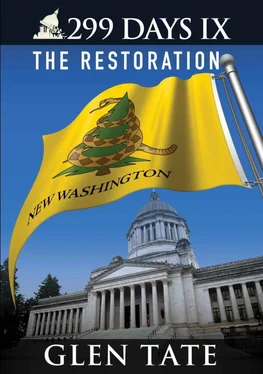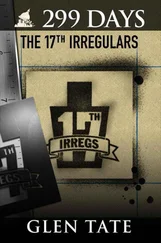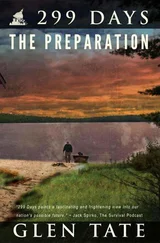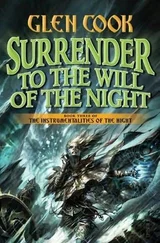That was because, at least for that first year, there were no taxes or regulations on commerce. None. Every law had been repealed. Business exploded. No more permits, licenses, environmental studies, or even taxes. That’s right: no more taxes. The Interim Government repealed all of them. They couldn’t collect them even if they wanted to; people were feeding themselves and that was about it. What would the new government, the freedom-loving Patriots, do? Seize a family’s food as “taxes.” That wasn’t the Patriot way.
The Interim Government basically ran on donations and captured goods. There was so little government that it wasn’t hard to do so. The only significant expense was the State Police. Donations were informal. Much like the Grange had just fed guards in Pierce Point, citizens who had extra food fed the security forces. Donations weren’t enough to live on, but they did help a lot.
The Interim Government primarily ran captured supplies. Limas’ property was seized with a judge overseeing things, but most of the Limas just took off to Seattle or elsewhere and there was no one there to claim the property. Seized Lima property supplied the State Police with food, ammunition, and fuel, which was about all they needed. Things were so broken down that the necessities were all people had or used.
Seized Lima houses, called “guesthouses,” were used temporarily by Interim Government officials. Grant used a seized Lima house in Olympia as his “guesthouse,” while his real house in Olympia was on a long list waiting to be repaired after Nancy Ringman trashed it.
The plan for after the elections was for the Legislature to pass very, very low taxes and cap them in the new Constitution. By capping taxes to a small percentage of the state’s gross domestic product, government could never grow like it did in the past. Yet, at the same time, government would have enough money to only do the one thing it was supposed to do: protect individual liberties. That was it. This was a shock to most people: the new government would only protect individual liberties. This wasn’t just the right thing to do; it was all that could be done. The New Washington government didn’t have enough resources to do anything else. Good.
“Critical industries” were another economic solution used by the Legislature after the interim period of no taxes and regulations expired. Industries essential to an economically independent and prosperous state, like agriculture, manufacturing, energy, and natural resources, were designated “critical industries,” which meant the government got the hell out of their way. The taxes and regulation did not return for these industries. Software, filling out government forms, and making lattes were not “critical industries” in New Washington.
Manufacturing, farming, fishing, and logging took off overnight. There were plenty of good jobs and lots of products. Prices were reasonable because there wasn’t layer upon layer of taxes and regulation artificially driving up the price.
In the southern and western states, which had broken away from the FUSA and were having booms of their own, domestic energy production shot up. Gasoline from there was plentiful and cheap in New Washington. And no more wars in the Middle East to fight, at least not with Americans fighting them, because the need for oil was gone. Grant would shake his head and wonder why in the world this hadn’t been done sooner.
New Washington rebuilt infrastructure much differently than the old state had done it. New Washington did it much more cheaply after the repeal of “prevailing wage” laws that ensured unions got all work, and the repeal of the layers and layers of complete overkill environmental regulations. And, of course, New Washington contracted out almost all of the work. There was now transparent and fair contracting; no inside deals. Total and complete disclosure of everything about the contracting. Corruption in contracting carried the death penalty. The past theft by contractors for the old state would not be tolerated.
Civil liberties were a huge part of the plan. Not “civil liberties” in the ACLU sense of the term, which they turned into meaning a “right” to welfare. No, real civil liberties, which meant protecting individual liberties, all the time, not just when it served a political agenda.
The New Washington government’s “plan” for civil liberties was extremely simple: follow the Constitution. Grant would laugh when people asked him if such a simple plan could work. He would ask them, “How did the Limas’ ‘sophisticated’ plans work out?”
A very good constitution to follow already existed. As good as the United States Constitution was, the old Washington State Constitution was actually better. Written in 1889, it had all the good stuff from the 1789 U.S. Constitution, but a hundred years of more wisdom in it. The old Washington State Constitution had amazing rights in it, but they were never actually followed by the old state. That was the problem: magnificent rights that were never followed. From the first few meetings of the Constitutional Convention Grant attended as a delegate, the general consensus was that the new Constitution would tweak the old one to make sure it didn’t slowly get whittled away, but all the good stuff would remain in the new version.
Now that they had a chance to start over and draft a constitution that truly protected civil liberties, and now that they had graphically seen what a few hundred years of chipping away at those rights led to, the people in New Washington had a very clear idea of what their new Constitution would say.
Government could no longer take things. Laws against takings without just compensation were strengthened. And takings through taxation was addressed by limiting taxes.
Not only would taxes be capped at a low rate, but the new Constitution would prohibit differing tax rates. New Washington would have flat taxes. The old system of huge tax rates for productive people while no one else effectively paying any led to a small percentage of productive people paying the freight for the large majority.
Another improvement in the new Constitution was that due process of law would actually mean something. No more “administrative hearings” that were kangaroo courts to rubber stamp the government’s decisions. Grant had seen plenty of those in the past. Now, juries would decide almost all things. Just like at Pierce Point, Grant thought. Under the new Constitution, it would take a jury to decide whether the state could take away people’s kids, not some social worker filling out a form. It was the same for mental illness commitments. And, in criminal cases, juries would get to hear the accused describe why he or she thought the law being enforced was unjust. The jury could decide to acquit if the law was indeed unjust. That would be a big deterrent to malicious prosecutions and a huge check on government power. What a tremendous power to let twelve people veto the application of an unjust law. It would be back in the new Constitution.
The new state Constitution had a few “no, really” clauses, as Grant called them. They laid out a civil liberty and then emphasized how important they were by basically saying “no, really don’t infringe this right.”
One of the “no, really” clauses—perhaps the most important and effective one—appeared in the sections on the judiciary. After describing that judges’ only obligation is to protect individual liberties and to neutrally apply constitutional laws duly passed by the Legislature and signed by the Governor, this was added: “Any decision of a judge in derogation of these obligations subjects that judge to a recall vote of the people.” Grant, having been an informal judge out at Pierce Point could understand how effective this would be. Now a bad decision infringing on civil liberties, coupled with a reasonably significant number of signatures on a petition, would put that judge on the ballot to keep his or her job. An enormous incentive to not do what the old state’s judges did.
Читать дальше











